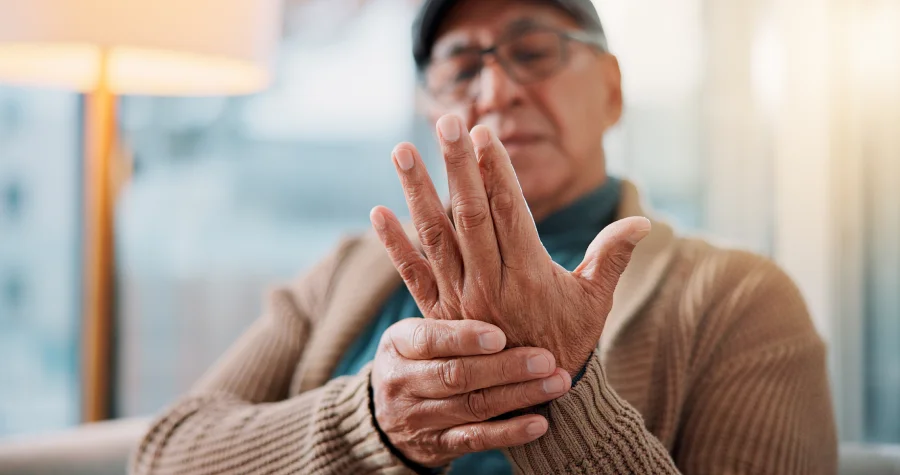When a loved one is diagnosed with Parkinson’s disease, many emotions and questions can arise. You want to do your absolute best to support them, whether you’re their partner, family member, or even a friend. But what should this look like?
As many of us aren’t natural-born caretakers, know that it will take time to learn the best ways to help your loved one deal with this challenging diagnosis. We have outlined some tips and advice on supporting someone with Parkinson’s to help get you started.

As one of the largest domiciliary care and support providers in Essex and Suffolk, the Forest Homecare team provides practical care services and support for those with Parkinson’s disease and their families. Please get in touch for more specialised advice.
What to say to someone just diagnosed with Parkinson’s?
Knowing what to say after a Parkinson’s diagnosis can feel daunting. You might be worried about saying the wrong thing or not knowing how to offer support. Simply being there, listening, and showing that you care, however, can mean the world to your loved one.
You don’t need to know all the answers. One of the most helpful things you can say is something as simple as “I’m here for you, no matter what.”
Let your loved one guide the conversation. Some people may want to walk through the diagnosis, whereas others may prefer a sense of normality and quiet support in the beginning.
Try to avoid focusing solely on the condition. While Parkinson’s is a part of their life now, it doesn’t define who they are. Reassure them that they are not alone and that you’ll face the challenges together.
How do you support someone with Parkinson’s?
Create a familiar and safe environment
Making the home safe and easy to move around in is one of the best ways to support someone with Parkinson’s. You don’t need major changes; even small updates can make a big difference.
Start by removing potential trip hazards like loose rugs, trailing wires, and clutter. Keep walkways clear and make sure rooms, hallways, and stairs are well-lit. Nightlights or motion-sensor lights can help with visibility at night.
Adding grab bars in the bathroom or near stairs provides extra support, and non-slip mats in the shower or bath can help prevent falls. Try to keep everyday items within easy reach and avoid moving furniture around too often. Familiar surroundings help build confidence and reduce confusion.
If you’re not sure where to start, an occupational therapist can assess the home and suggest simple, practical changes to make it safer and more comfortable.
Help with daily tasks while encouraging independence
When supporting a loved one with Parkinson’s, it can be tempting to step in and do everything for them, especially on those harder days. But encouraging independence is just as important as offering help. Let them do as much as they feel able to, even if it takes a little longer.
Simple changes (like using easy-grip utensils, dressing aids, or a shower chair) can make daily tasks safer and more manageable. It’s all about finding the right balance between being there when they need support, but also giving them the space and confidence to stay active and involved in their own care.
Adapt support as needs change
Parkinson’s is a progressive condition, which means your loved one’s needs may change over time. What works well today might need adjusting in the future, and that’s completely normal.
Regularly check in to see how your loved one is managing daily tasks, and be open to trying new ways of doing things. This might mean introducing mobility aids, adjusting routines, or seeking extra help at home. Working with professionals, like care providers and occupational therapists, can help you stay one step ahead and make sure your support continues to meet their needs.
Work with healthcare professionals
Involving healthcare professionals early on can make a big difference to both your loved one’s wellbeing and your own peace of mind. Specialist nurses, occupational therapists, physiotherapists, and other medical teams can offer advice tailored to your loved one’s changing needs (from mobility and medication to speech and swallowing).
Professional care providers, like Forest Homecare, can also step in with practical support at home, giving you a much-needed break while ensuring your loved one gets the care they deserve. Seeking help isn’t a sign of weakness; it’s a sign of thoughtful, proactive care.
Caring for yourself while supporting someone with Parkinson’s
Caring for someone with Parkinson’s can be deeply rewarding, but it can also be physically and emotionally demanding. It’s important to remember that you can’t pour from an empty cup.
Make time for rest, connect with others, and talk about how you’re feeling. Whether it’s through a local support group, a chat with a friend, or speaking to your GP, reaching out can make a big difference.
Supporting someone with Parkinson’s is a journey, not a sprint
Supporting a loved one with Parkinson’s isn’t always easy, but your care, patience, and presence can make a real difference in their day-to-day life. Whether you’re helping with practical tasks, adapting the home, or simply offering a listening ear, every small act of support matters.
Remember, you don’t have to do it all on your own. There are professional services, support networks, and caring organisations, like Forest Homecare, here to help when you need it.
If you’re looking for tailored advice or practical in-home support, please don’t hesitate to reach out. We’re here for you and your loved one every step of the way.





